Analyzing Global Sourcing Strategies: A Johnson & Johnson Case Study
VerifiedAdded on 2023/06/11
|8
|1966
|254
Case Study
AI Summary
This case study explores Johnson & Johnson's global sourcing strategies, focusing on best practices in supply chain management. It examines the company's implementation of responsible global sourcing, highlighting its impact on sustainability, risk management, and supplier relationships. The report details Johnson & Johnson's commitment to corporate social responsibility through initiatives like the Citizen Center of Excellence (CoE) and Sustainable Procurement Program (SPP). It discusses the benefits of global sourcing, including improved quality, reduced carbon footprint, and enhanced brand reputation. The analysis also considers the broader applicability of global sourcing in manufacturing sectors and its potential evolution, emphasizing the importance of stakeholder collaboration and sustainable resource management. Desklib provides access to this case study and other solved assignments for students.

UNIT:
NAME:
DATE:
NAME:
DATE:
Paraphrase This Document
Need a fresh take? Get an instant paraphrase of this document with our AI Paraphraser
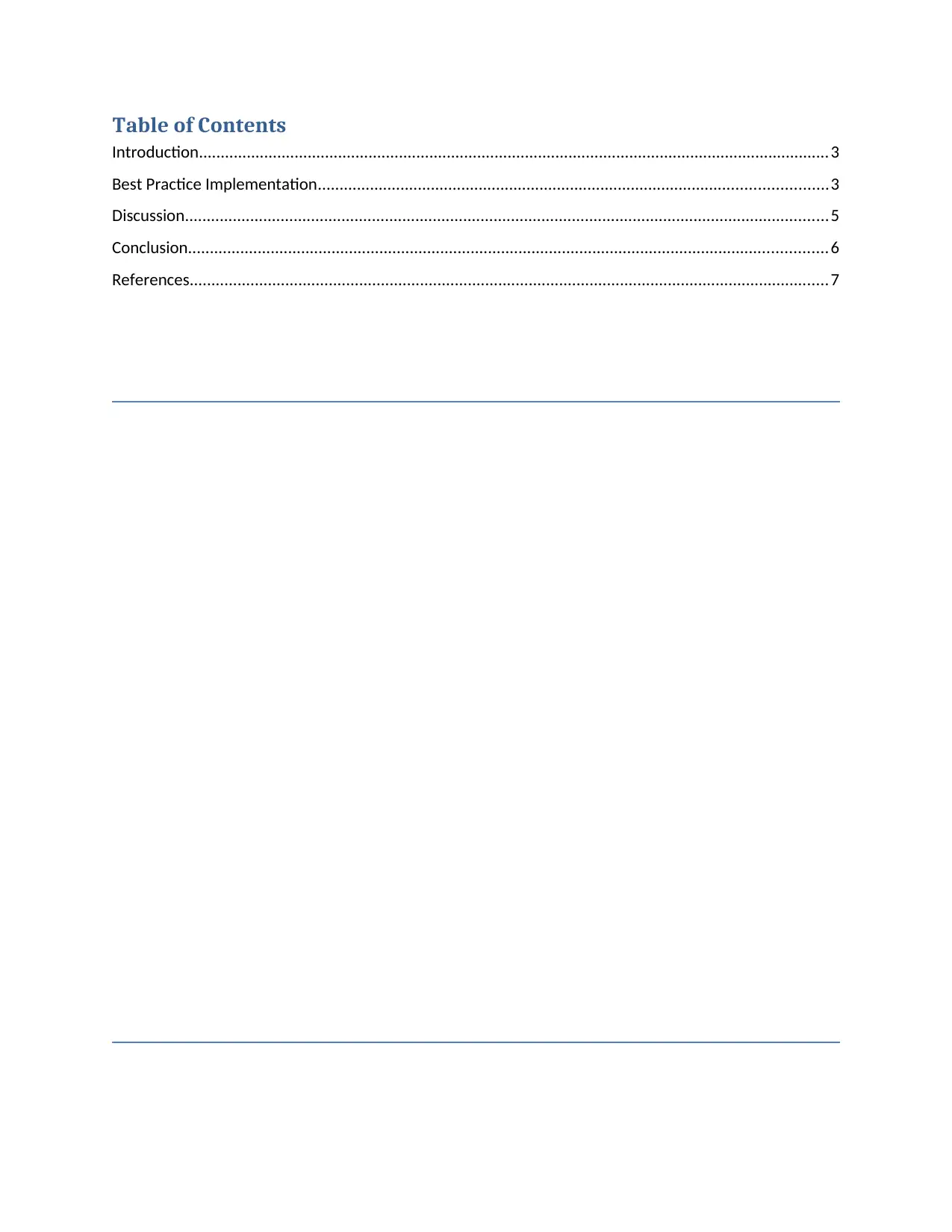
Table of Contents
Introduction.................................................................................................................................................3
Best Practice Implementation.....................................................................................................................3
Discussion....................................................................................................................................................5
Conclusion...................................................................................................................................................6
References...................................................................................................................................................7
Introduction.................................................................................................................................................3
Best Practice Implementation.....................................................................................................................3
Discussion....................................................................................................................................................5
Conclusion...................................................................................................................................................6
References...................................................................................................................................................7
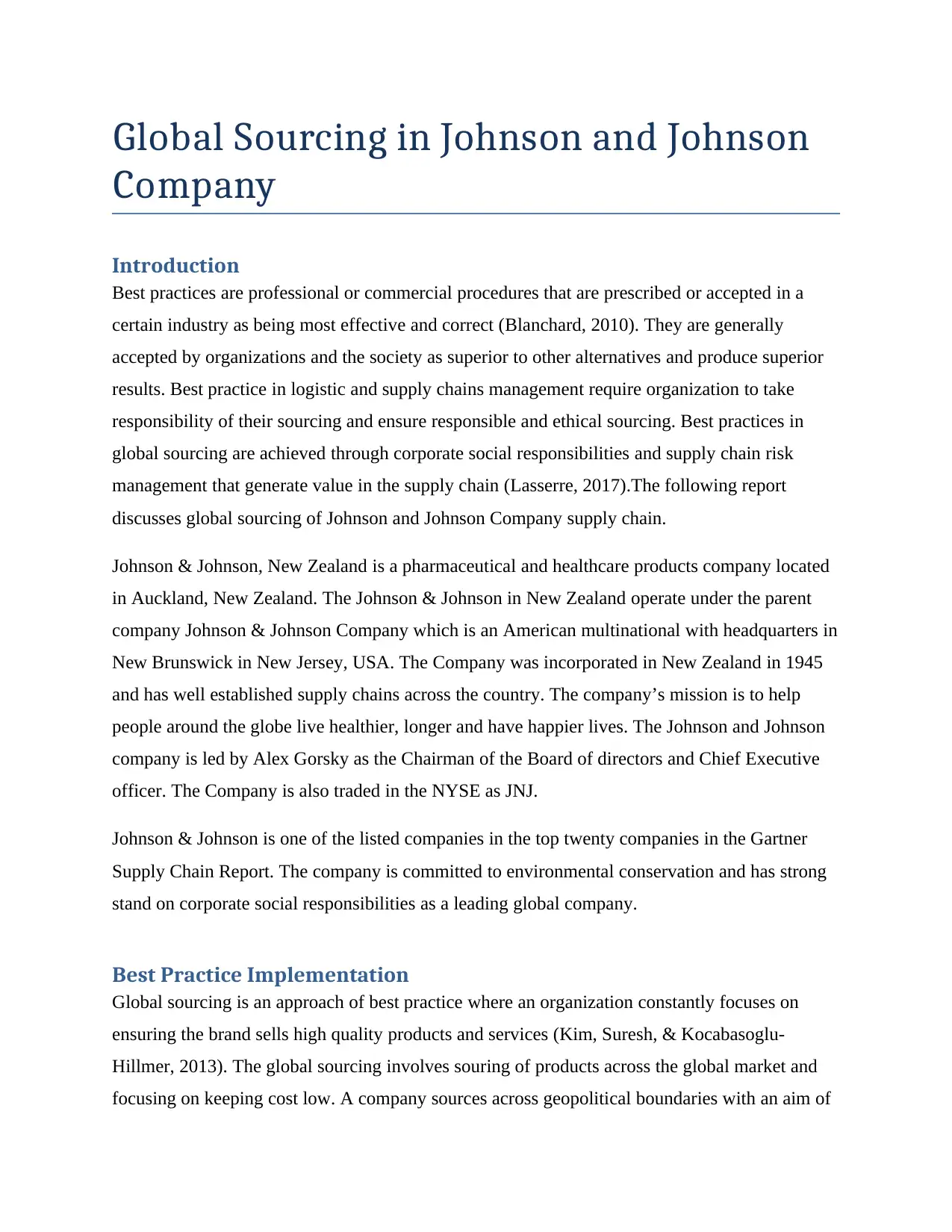
Global Sourcing in Johnson and Johnson
Company
Introduction
Best practices are professional or commercial procedures that are prescribed or accepted in a
certain industry as being most effective and correct (Blanchard, 2010). They are generally
accepted by organizations and the society as superior to other alternatives and produce superior
results. Best practice in logistic and supply chains management require organization to take
responsibility of their sourcing and ensure responsible and ethical sourcing. Best practices in
global sourcing are achieved through corporate social responsibilities and supply chain risk
management that generate value in the supply chain (Lasserre, 2017).The following report
discusses global sourcing of Johnson and Johnson Company supply chain.
Johnson & Johnson, New Zealand is a pharmaceutical and healthcare products company located
in Auckland, New Zealand. The Johnson & Johnson in New Zealand operate under the parent
company Johnson & Johnson Company which is an American multinational with headquarters in
New Brunswick in New Jersey, USA. The Company was incorporated in New Zealand in 1945
and has well established supply chains across the country. The company’s mission is to help
people around the globe live healthier, longer and have happier lives. The Johnson and Johnson
company is led by Alex Gorsky as the Chairman of the Board of directors and Chief Executive
officer. The Company is also traded in the NYSE as JNJ.
Johnson & Johnson is one of the listed companies in the top twenty companies in the Gartner
Supply Chain Report. The company is committed to environmental conservation and has strong
stand on corporate social responsibilities as a leading global company.
Best Practice Implementation
Global sourcing is an approach of best practice where an organization constantly focuses on
ensuring the brand sells high quality products and services (Kim, Suresh, & Kocabasoglu-
Hillmer, 2013). The global sourcing involves souring of products across the global market and
focusing on keeping cost low. A company sources across geopolitical boundaries with an aim of
Company
Introduction
Best practices are professional or commercial procedures that are prescribed or accepted in a
certain industry as being most effective and correct (Blanchard, 2010). They are generally
accepted by organizations and the society as superior to other alternatives and produce superior
results. Best practice in logistic and supply chains management require organization to take
responsibility of their sourcing and ensure responsible and ethical sourcing. Best practices in
global sourcing are achieved through corporate social responsibilities and supply chain risk
management that generate value in the supply chain (Lasserre, 2017).The following report
discusses global sourcing of Johnson and Johnson Company supply chain.
Johnson & Johnson, New Zealand is a pharmaceutical and healthcare products company located
in Auckland, New Zealand. The Johnson & Johnson in New Zealand operate under the parent
company Johnson & Johnson Company which is an American multinational with headquarters in
New Brunswick in New Jersey, USA. The Company was incorporated in New Zealand in 1945
and has well established supply chains across the country. The company’s mission is to help
people around the globe live healthier, longer and have happier lives. The Johnson and Johnson
company is led by Alex Gorsky as the Chairman of the Board of directors and Chief Executive
officer. The Company is also traded in the NYSE as JNJ.
Johnson & Johnson is one of the listed companies in the top twenty companies in the Gartner
Supply Chain Report. The company is committed to environmental conservation and has strong
stand on corporate social responsibilities as a leading global company.
Best Practice Implementation
Global sourcing is an approach of best practice where an organization constantly focuses on
ensuring the brand sells high quality products and services (Kim, Suresh, & Kocabasoglu-
Hillmer, 2013). The global sourcing involves souring of products across the global market and
focusing on keeping cost low. A company sources across geopolitical boundaries with an aim of
⊘ This is a preview!⊘
Do you want full access?
Subscribe today to unlock all pages.

Trusted by 1+ million students worldwide
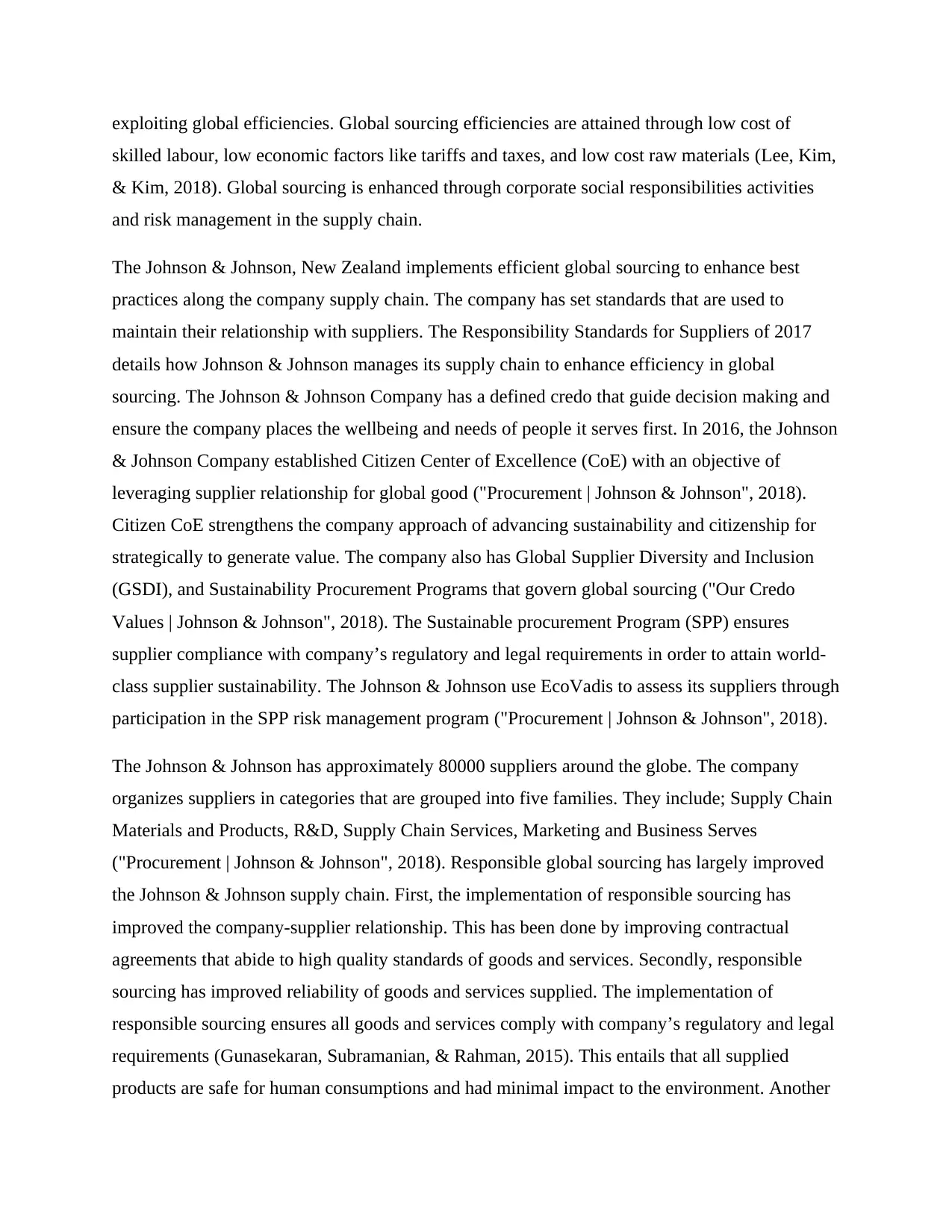
exploiting global efficiencies. Global sourcing efficiencies are attained through low cost of
skilled labour, low economic factors like tariffs and taxes, and low cost raw materials (Lee, Kim,
& Kim, 2018). Global sourcing is enhanced through corporate social responsibilities activities
and risk management in the supply chain.
The Johnson & Johnson, New Zealand implements efficient global sourcing to enhance best
practices along the company supply chain. The company has set standards that are used to
maintain their relationship with suppliers. The Responsibility Standards for Suppliers of 2017
details how Johnson & Johnson manages its supply chain to enhance efficiency in global
sourcing. The Johnson & Johnson Company has a defined credo that guide decision making and
ensure the company places the wellbeing and needs of people it serves first. In 2016, the Johnson
& Johnson Company established Citizen Center of Excellence (CoE) with an objective of
leveraging supplier relationship for global good ("Procurement | Johnson & Johnson", 2018).
Citizen CoE strengthens the company approach of advancing sustainability and citizenship for
strategically to generate value. The company also has Global Supplier Diversity and Inclusion
(GSDI), and Sustainability Procurement Programs that govern global sourcing ("Our Credo
Values | Johnson & Johnson", 2018). The Sustainable procurement Program (SPP) ensures
supplier compliance with company’s regulatory and legal requirements in order to attain world-
class supplier sustainability. The Johnson & Johnson use EcoVadis to assess its suppliers through
participation in the SPP risk management program ("Procurement | Johnson & Johnson", 2018).
The Johnson & Johnson has approximately 80000 suppliers around the globe. The company
organizes suppliers in categories that are grouped into five families. They include; Supply Chain
Materials and Products, R&D, Supply Chain Services, Marketing and Business Serves
("Procurement | Johnson & Johnson", 2018). Responsible global sourcing has largely improved
the Johnson & Johnson supply chain. First, the implementation of responsible sourcing has
improved the company-supplier relationship. This has been done by improving contractual
agreements that abide to high quality standards of goods and services. Secondly, responsible
sourcing has improved reliability of goods and services supplied. The implementation of
responsible sourcing ensures all goods and services comply with company’s regulatory and legal
requirements (Gunasekaran, Subramanian, & Rahman, 2015). This entails that all supplied
products are safe for human consumptions and had minimal impact to the environment. Another
skilled labour, low economic factors like tariffs and taxes, and low cost raw materials (Lee, Kim,
& Kim, 2018). Global sourcing is enhanced through corporate social responsibilities activities
and risk management in the supply chain.
The Johnson & Johnson, New Zealand implements efficient global sourcing to enhance best
practices along the company supply chain. The company has set standards that are used to
maintain their relationship with suppliers. The Responsibility Standards for Suppliers of 2017
details how Johnson & Johnson manages its supply chain to enhance efficiency in global
sourcing. The Johnson & Johnson Company has a defined credo that guide decision making and
ensure the company places the wellbeing and needs of people it serves first. In 2016, the Johnson
& Johnson Company established Citizen Center of Excellence (CoE) with an objective of
leveraging supplier relationship for global good ("Procurement | Johnson & Johnson", 2018).
Citizen CoE strengthens the company approach of advancing sustainability and citizenship for
strategically to generate value. The company also has Global Supplier Diversity and Inclusion
(GSDI), and Sustainability Procurement Programs that govern global sourcing ("Our Credo
Values | Johnson & Johnson", 2018). The Sustainable procurement Program (SPP) ensures
supplier compliance with company’s regulatory and legal requirements in order to attain world-
class supplier sustainability. The Johnson & Johnson use EcoVadis to assess its suppliers through
participation in the SPP risk management program ("Procurement | Johnson & Johnson", 2018).
The Johnson & Johnson has approximately 80000 suppliers around the globe. The company
organizes suppliers in categories that are grouped into five families. They include; Supply Chain
Materials and Products, R&D, Supply Chain Services, Marketing and Business Serves
("Procurement | Johnson & Johnson", 2018). Responsible global sourcing has largely improved
the Johnson & Johnson supply chain. First, the implementation of responsible sourcing has
improved the company-supplier relationship. This has been done by improving contractual
agreements that abide to high quality standards of goods and services. Secondly, responsible
sourcing has improved reliability of goods and services supplied. The implementation of
responsible sourcing ensures all goods and services comply with company’s regulatory and legal
requirements (Gunasekaran, Subramanian, & Rahman, 2015). This entails that all supplied
products are safe for human consumptions and had minimal impact to the environment. Another
Paraphrase This Document
Need a fresh take? Get an instant paraphrase of this document with our AI Paraphraser
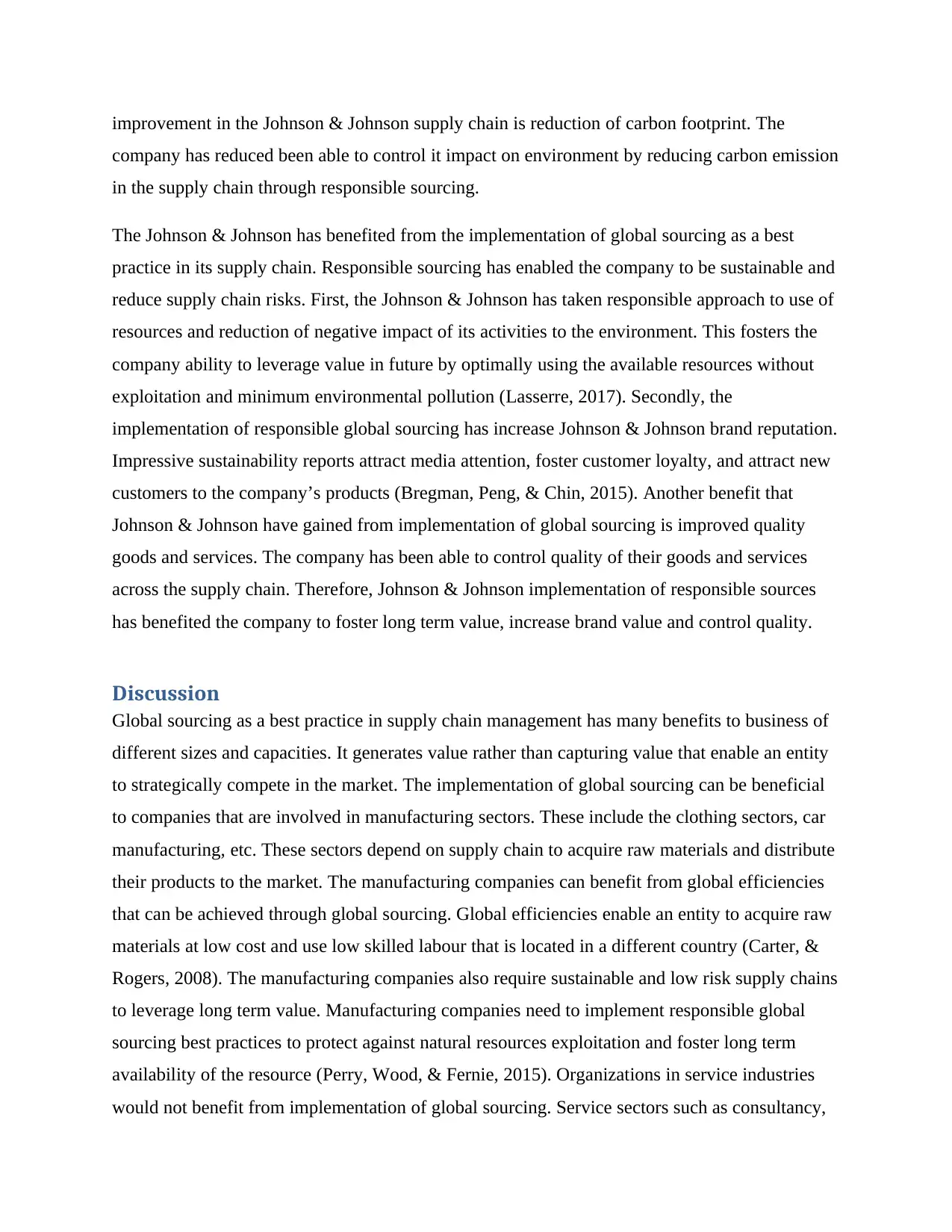
improvement in the Johnson & Johnson supply chain is reduction of carbon footprint. The
company has reduced been able to control it impact on environment by reducing carbon emission
in the supply chain through responsible sourcing.
The Johnson & Johnson has benefited from the implementation of global sourcing as a best
practice in its supply chain. Responsible sourcing has enabled the company to be sustainable and
reduce supply chain risks. First, the Johnson & Johnson has taken responsible approach to use of
resources and reduction of negative impact of its activities to the environment. This fosters the
company ability to leverage value in future by optimally using the available resources without
exploitation and minimum environmental pollution (Lasserre, 2017). Secondly, the
implementation of responsible global sourcing has increase Johnson & Johnson brand reputation.
Impressive sustainability reports attract media attention, foster customer loyalty, and attract new
customers to the company’s products (Bregman, Peng, & Chin, 2015). Another benefit that
Johnson & Johnson have gained from implementation of global sourcing is improved quality
goods and services. The company has been able to control quality of their goods and services
across the supply chain. Therefore, Johnson & Johnson implementation of responsible sources
has benefited the company to foster long term value, increase brand value and control quality.
Discussion
Global sourcing as a best practice in supply chain management has many benefits to business of
different sizes and capacities. It generates value rather than capturing value that enable an entity
to strategically compete in the market. The implementation of global sourcing can be beneficial
to companies that are involved in manufacturing sectors. These include the clothing sectors, car
manufacturing, etc. These sectors depend on supply chain to acquire raw materials and distribute
their products to the market. The manufacturing companies can benefit from global efficiencies
that can be achieved through global sourcing. Global efficiencies enable an entity to acquire raw
materials at low cost and use low skilled labour that is located in a different country (Carter, &
Rogers, 2008). The manufacturing companies also require sustainable and low risk supply chains
to leverage long term value. Manufacturing companies need to implement responsible global
sourcing best practices to protect against natural resources exploitation and foster long term
availability of the resource (Perry, Wood, & Fernie, 2015). Organizations in service industries
would not benefit from implementation of global sourcing. Service sectors such as consultancy,
company has reduced been able to control it impact on environment by reducing carbon emission
in the supply chain through responsible sourcing.
The Johnson & Johnson has benefited from the implementation of global sourcing as a best
practice in its supply chain. Responsible sourcing has enabled the company to be sustainable and
reduce supply chain risks. First, the Johnson & Johnson has taken responsible approach to use of
resources and reduction of negative impact of its activities to the environment. This fosters the
company ability to leverage value in future by optimally using the available resources without
exploitation and minimum environmental pollution (Lasserre, 2017). Secondly, the
implementation of responsible global sourcing has increase Johnson & Johnson brand reputation.
Impressive sustainability reports attract media attention, foster customer loyalty, and attract new
customers to the company’s products (Bregman, Peng, & Chin, 2015). Another benefit that
Johnson & Johnson have gained from implementation of global sourcing is improved quality
goods and services. The company has been able to control quality of their goods and services
across the supply chain. Therefore, Johnson & Johnson implementation of responsible sources
has benefited the company to foster long term value, increase brand value and control quality.
Discussion
Global sourcing as a best practice in supply chain management has many benefits to business of
different sizes and capacities. It generates value rather than capturing value that enable an entity
to strategically compete in the market. The implementation of global sourcing can be beneficial
to companies that are involved in manufacturing sectors. These include the clothing sectors, car
manufacturing, etc. These sectors depend on supply chain to acquire raw materials and distribute
their products to the market. The manufacturing companies can benefit from global efficiencies
that can be achieved through global sourcing. Global efficiencies enable an entity to acquire raw
materials at low cost and use low skilled labour that is located in a different country (Carter, &
Rogers, 2008). The manufacturing companies also require sustainable and low risk supply chains
to leverage long term value. Manufacturing companies need to implement responsible global
sourcing best practices to protect against natural resources exploitation and foster long term
availability of the resource (Perry, Wood, & Fernie, 2015). Organizations in service industries
would not benefit from implementation of global sourcing. Service sectors such as consultancy,
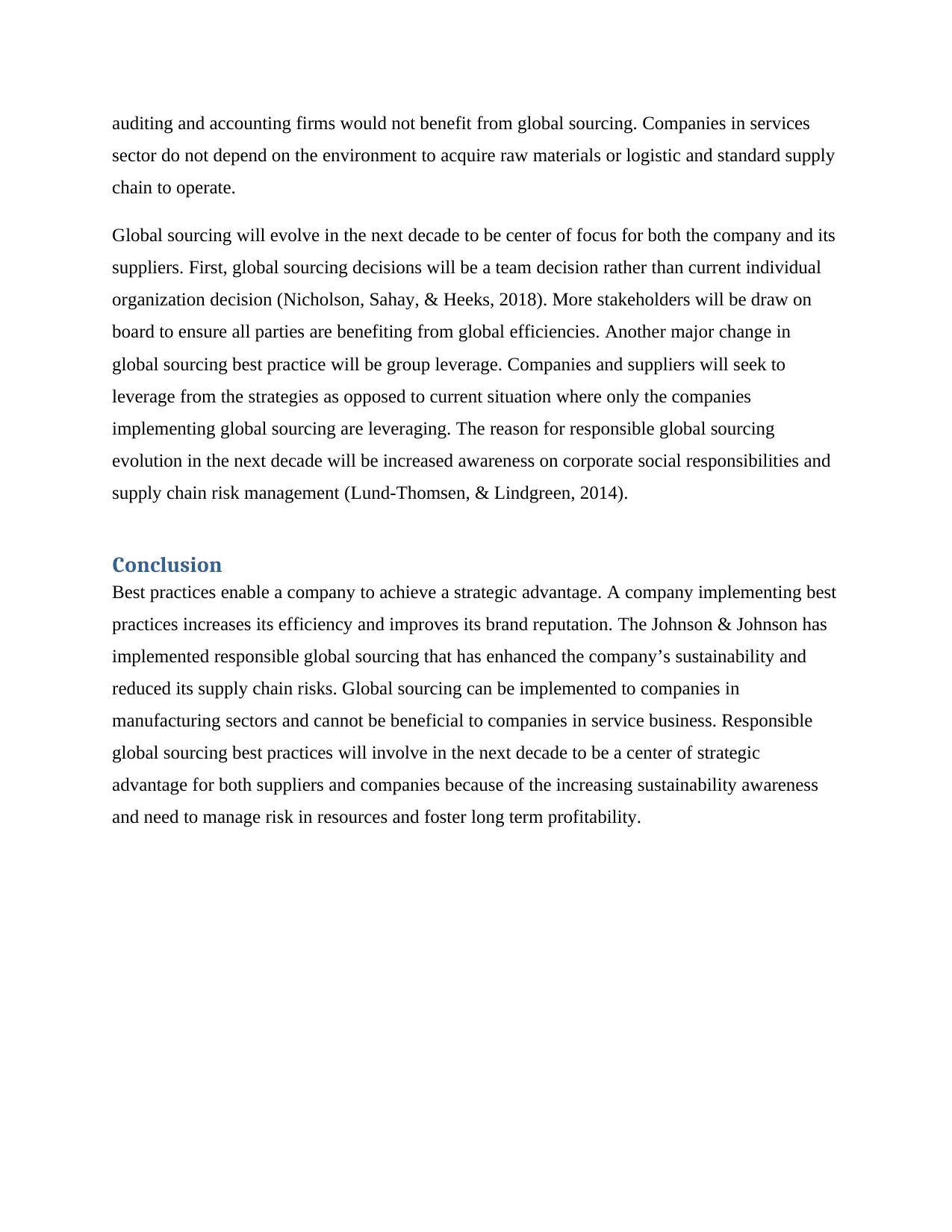
auditing and accounting firms would not benefit from global sourcing. Companies in services
sector do not depend on the environment to acquire raw materials or logistic and standard supply
chain to operate.
Global sourcing will evolve in the next decade to be center of focus for both the company and its
suppliers. First, global sourcing decisions will be a team decision rather than current individual
organization decision (Nicholson, Sahay, & Heeks, 2018). More stakeholders will be draw on
board to ensure all parties are benefiting from global efficiencies. Another major change in
global sourcing best practice will be group leverage. Companies and suppliers will seek to
leverage from the strategies as opposed to current situation where only the companies
implementing global sourcing are leveraging. The reason for responsible global sourcing
evolution in the next decade will be increased awareness on corporate social responsibilities and
supply chain risk management (Lund-Thomsen, & Lindgreen, 2014).
Conclusion
Best practices enable a company to achieve a strategic advantage. A company implementing best
practices increases its efficiency and improves its brand reputation. The Johnson & Johnson has
implemented responsible global sourcing that has enhanced the company’s sustainability and
reduced its supply chain risks. Global sourcing can be implemented to companies in
manufacturing sectors and cannot be beneficial to companies in service business. Responsible
global sourcing best practices will involve in the next decade to be a center of strategic
advantage for both suppliers and companies because of the increasing sustainability awareness
and need to manage risk in resources and foster long term profitability.
sector do not depend on the environment to acquire raw materials or logistic and standard supply
chain to operate.
Global sourcing will evolve in the next decade to be center of focus for both the company and its
suppliers. First, global sourcing decisions will be a team decision rather than current individual
organization decision (Nicholson, Sahay, & Heeks, 2018). More stakeholders will be draw on
board to ensure all parties are benefiting from global efficiencies. Another major change in
global sourcing best practice will be group leverage. Companies and suppliers will seek to
leverage from the strategies as opposed to current situation where only the companies
implementing global sourcing are leveraging. The reason for responsible global sourcing
evolution in the next decade will be increased awareness on corporate social responsibilities and
supply chain risk management (Lund-Thomsen, & Lindgreen, 2014).
Conclusion
Best practices enable a company to achieve a strategic advantage. A company implementing best
practices increases its efficiency and improves its brand reputation. The Johnson & Johnson has
implemented responsible global sourcing that has enhanced the company’s sustainability and
reduced its supply chain risks. Global sourcing can be implemented to companies in
manufacturing sectors and cannot be beneficial to companies in service business. Responsible
global sourcing best practices will involve in the next decade to be a center of strategic
advantage for both suppliers and companies because of the increasing sustainability awareness
and need to manage risk in resources and foster long term profitability.
⊘ This is a preview!⊘
Do you want full access?
Subscribe today to unlock all pages.

Trusted by 1+ million students worldwide
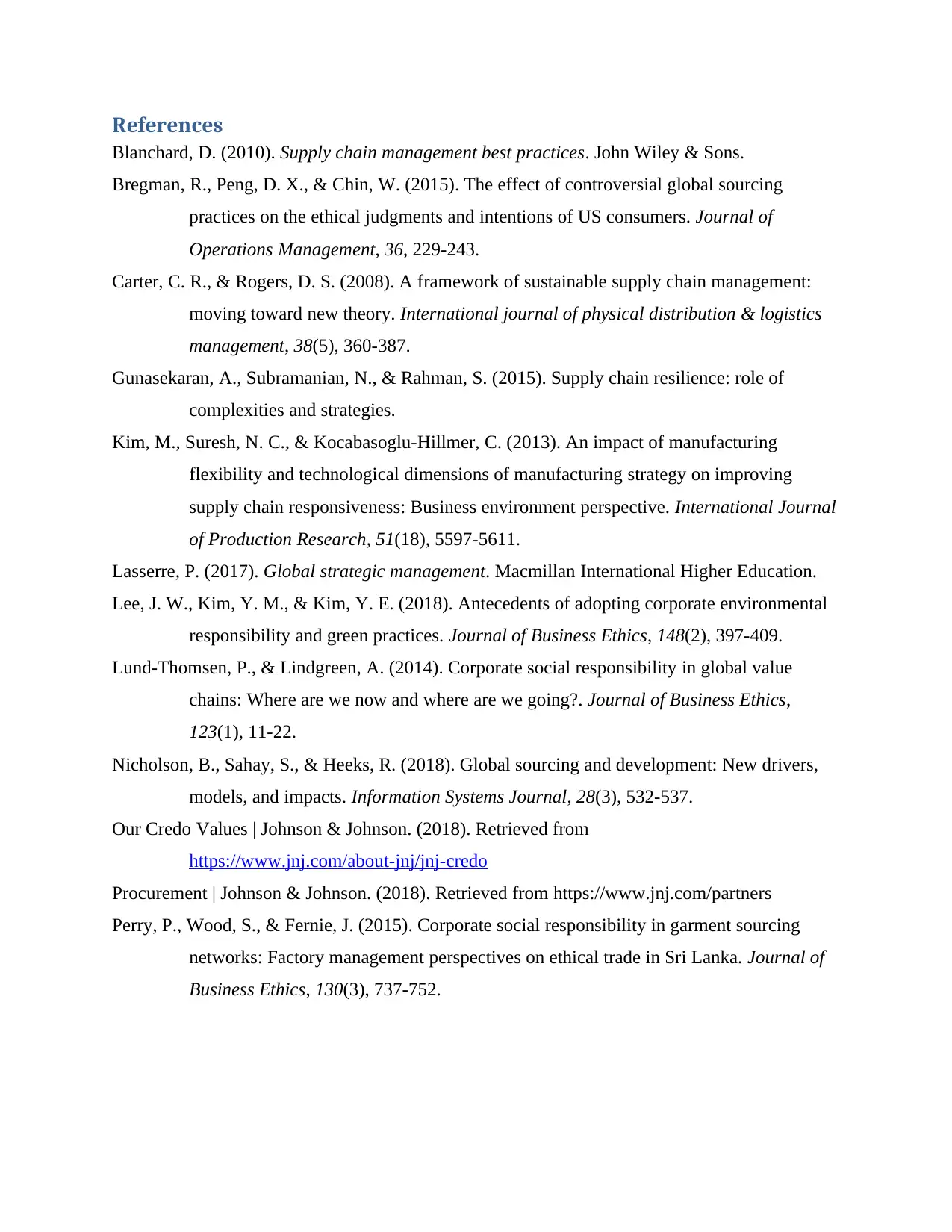
References
Blanchard, D. (2010). Supply chain management best practices. John Wiley & Sons.
Bregman, R., Peng, D. X., & Chin, W. (2015). The effect of controversial global sourcing
practices on the ethical judgments and intentions of US consumers. Journal of
Operations Management, 36, 229-243.
Carter, C. R., & Rogers, D. S. (2008). A framework of sustainable supply chain management:
moving toward new theory. International journal of physical distribution & logistics
management, 38(5), 360-387.
Gunasekaran, A., Subramanian, N., & Rahman, S. (2015). Supply chain resilience: role of
complexities and strategies.
Kim, M., Suresh, N. C., & Kocabasoglu-Hillmer, C. (2013). An impact of manufacturing
flexibility and technological dimensions of manufacturing strategy on improving
supply chain responsiveness: Business environment perspective. International Journal
of Production Research, 51(18), 5597-5611.
Lasserre, P. (2017). Global strategic management. Macmillan International Higher Education.
Lee, J. W., Kim, Y. M., & Kim, Y. E. (2018). Antecedents of adopting corporate environmental
responsibility and green practices. Journal of Business Ethics, 148(2), 397-409.
Lund-Thomsen, P., & Lindgreen, A. (2014). Corporate social responsibility in global value
chains: Where are we now and where are we going?. Journal of Business Ethics,
123(1), 11-22.
Nicholson, B., Sahay, S., & Heeks, R. (2018). Global sourcing and development: New drivers,
models, and impacts. Information Systems Journal, 28(3), 532-537.
Our Credo Values | Johnson & Johnson. (2018). Retrieved from
https://www.jnj.com/about-jnj/jnj-credo
Procurement | Johnson & Johnson. (2018). Retrieved from https://www.jnj.com/partners
Perry, P., Wood, S., & Fernie, J. (2015). Corporate social responsibility in garment sourcing
networks: Factory management perspectives on ethical trade in Sri Lanka. Journal of
Business Ethics, 130(3), 737-752.
Blanchard, D. (2010). Supply chain management best practices. John Wiley & Sons.
Bregman, R., Peng, D. X., & Chin, W. (2015). The effect of controversial global sourcing
practices on the ethical judgments and intentions of US consumers. Journal of
Operations Management, 36, 229-243.
Carter, C. R., & Rogers, D. S. (2008). A framework of sustainable supply chain management:
moving toward new theory. International journal of physical distribution & logistics
management, 38(5), 360-387.
Gunasekaran, A., Subramanian, N., & Rahman, S. (2015). Supply chain resilience: role of
complexities and strategies.
Kim, M., Suresh, N. C., & Kocabasoglu-Hillmer, C. (2013). An impact of manufacturing
flexibility and technological dimensions of manufacturing strategy on improving
supply chain responsiveness: Business environment perspective. International Journal
of Production Research, 51(18), 5597-5611.
Lasserre, P. (2017). Global strategic management. Macmillan International Higher Education.
Lee, J. W., Kim, Y. M., & Kim, Y. E. (2018). Antecedents of adopting corporate environmental
responsibility and green practices. Journal of Business Ethics, 148(2), 397-409.
Lund-Thomsen, P., & Lindgreen, A. (2014). Corporate social responsibility in global value
chains: Where are we now and where are we going?. Journal of Business Ethics,
123(1), 11-22.
Nicholson, B., Sahay, S., & Heeks, R. (2018). Global sourcing and development: New drivers,
models, and impacts. Information Systems Journal, 28(3), 532-537.
Our Credo Values | Johnson & Johnson. (2018). Retrieved from
https://www.jnj.com/about-jnj/jnj-credo
Procurement | Johnson & Johnson. (2018). Retrieved from https://www.jnj.com/partners
Perry, P., Wood, S., & Fernie, J. (2015). Corporate social responsibility in garment sourcing
networks: Factory management perspectives on ethical trade in Sri Lanka. Journal of
Business Ethics, 130(3), 737-752.
Paraphrase This Document
Need a fresh take? Get an instant paraphrase of this document with our AI Paraphraser

1 out of 8
Related Documents
Your All-in-One AI-Powered Toolkit for Academic Success.
+13062052269
info@desklib.com
Available 24*7 on WhatsApp / Email
![[object Object]](/_next/static/media/star-bottom.7253800d.svg)
Unlock your academic potential
Copyright © 2020–2026 A2Z Services. All Rights Reserved. Developed and managed by ZUCOL.




